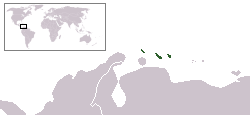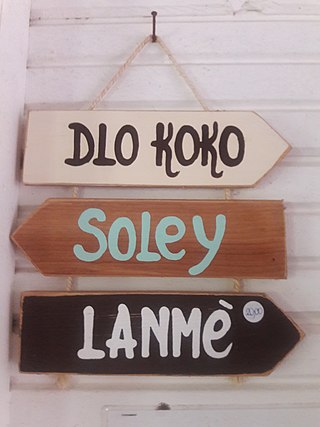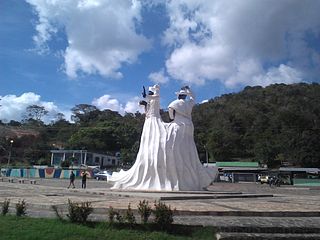Patois is speech or language that is considered nonstandard, although the term is not formally defined in linguistics. As such, patois can refer to pidgins, creoles, dialects or vernaculars, but not commonly to jargon or slang, which are vocabulary-based forms of cant.

The French West Indies or French Antilles are the parts of France located in the Antilles islands of the Caribbean:

Papiamento or Papiamentu is a Portuguese-based creole language spoken in the Dutch Caribbean. It is the most widely spoken language on the ABC islands.

A Spanish creole, or Spanish-based creole language, is a creole language for which Spanish serves as its substantial lexifier.

Bolívar is one of the 23 states of Venezuela. The state capital city is Ciudad Bolívar and the largest city is Ciudad Guayana. Bolívar State covers a total surface area of 242,801 km2 (93,746 sq mi) and as of the 2011 census, had a population of 1,410,964. The state contains Angel Falls.

Antillean Creole is a French-based creole that is primarily spoken in the Lesser Antilles. Its grammar and vocabulary include elements of French, Carib, English, and African languages.
Latin Americans are the citizens of Latin American countries.

The Guianas, also spelled Guyanas or Guayanas, is a geographical region in north-eastern South America. Strictly, the term refers to the three Guianas: Guyana, Suriname, and French Guiana, formerly British, Dutch, and French Guiana. Broadly, it refers to the South American coast from the mouth of the Orinoco to the mouth of the Amazon.
Limonese Creole is a dialect of Jamaican Patois, an English-based creole language, spoken in Limón Province on the Caribbean Sea coast of Costa Rica. The number of native speakers is unknown, but 1986 estimates suggests that there are fewer than 60,000 native and second language speakers combined.

Caribbean Spanish is the general name of the Spanish dialects spoken in the Caribbean region. The Spanish language was introduced to the Caribbean in 1492 with the voyages of Christopher Columbus. It resembles the Spanish spoken in the Canary Islands, and, more distantly, the Spanish of western Andalusia. With more than 25 million speakers, Spanish is the most widely spoken language in the Caribbean Islands.

A French creole, or French-based creole language, is a creole for which French is the lexifier. Most often this lexifier is not modern French but rather a 17th- or 18th-century koiné of French from Paris, the French Atlantic harbors, and the nascent French colonies. This article also contains information on French pidgin languages, contact languages that lack native speakers.

The languages of Venezuela refers to the official languages and various dialects spoken in established communities within the country. In Venezuela, Castillian is the official language and is the mother tongue of the majority of Venezuelans. Although there is an established official language, there are countless languages of indigenous villages spoken throughout Venezuela, and various regions also have languages of their own.
The languages of North America reflect not only that continent's indigenous peoples, but the European colonization as well. The most widely spoken languages in North America are English, Spanish, and to a lesser extent French, and especially in the Caribbean, creole languages lexified by them.
The Venezuelan festival known in Spanish as Calypso de El Callao is held every year in Bolívar state, during carnival celebrations. It is a fusion of Trinidad and Tobago calypso music, Caribbean traditions and Venezuelan folklore.

Panamanian Spanish is the Spanish language as spoken in the country of Panama. Despite Panama's location in Central America, Panamanian Spanish is considered a Caribbean variety.

The El Callao Municipality is one of the 11 municipalities (municipios) that makes up the Venezuelan state of Bolívar and, according to the 2011 census by the National Institute of Statistics of Venezuela, the municipality has a population of 21,769. The town of El Callao is the shire town of the El Callao Municipality.

The languages of the Caribbean reflect the region's diverse history and culture. There are six official languages spoken in the Caribbean:

The Dutch Caribbean are the New World territories, colonies, and countries of the Dutch Empire and the Kingdom of the Netherlands located in the Caribbean Sea, mainly the northern and southwestern regions of the Lesser Antilles archipelago.

Trinidadian Spanish refers to the Spanish natively spoken by Cocoa Panyols in Trinidad and Tobago which is very close to extinction.









